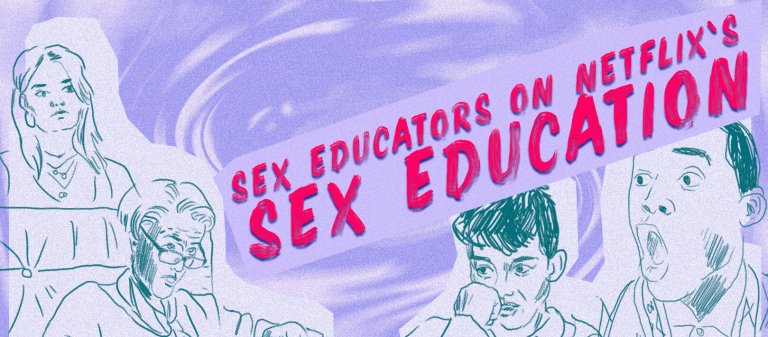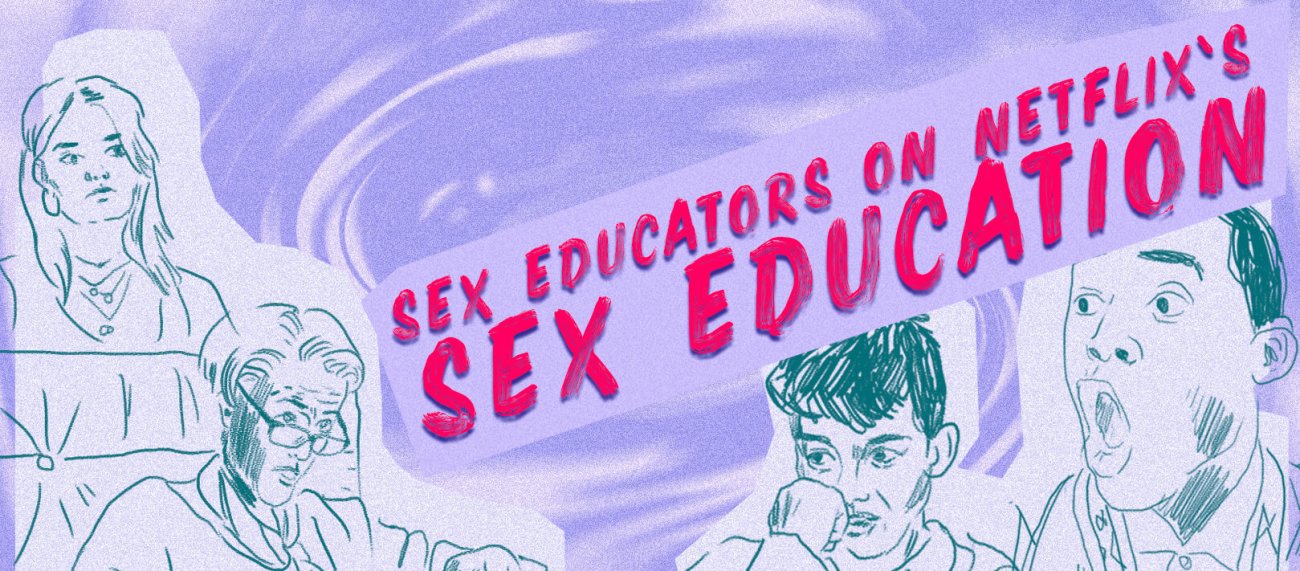Sex Educators on Netflix's Sex Education
The fourth and final season of Netflix’s hit comedy Sex Education will launch on 21st September 2023. Following the (spoiler alert!) closure of Moordale Secondary in Season 3, Eric and Otis face their first day at progressive Cavendish Sixth Form College. Will Otis’s sex clinic be a success? Will he finally get together with Mauve, who is currently studying in the USA? How is Jean coping with motherhood, and who is the father of her baby? And what will the new characters teach us (and each other) about navigating sex and relationships?
As we wait to find out what happens next, we decided to speak to real sex educators* about what they think of the show. Is Jean a good sex educator? Is Otis’s sex therapy legit? Read on to find out what they think.
What do you think of Netflix’s Sex Education?
Remember that scene from Buffy when she gets annoyed at an action film for not doing the fight scenes correctly? It can be hard to see people getting your job wrong on TV, especially when the way these roles are portrayed can have an impact on whether people seek these services out in real life. With that in mind, we asked our sex educators how they feel about Netflix’s Sex Education.
“Confession: I almost never watch Netflix, but I binged this show. For professional reasons, of course!” says sex and intimacy counsellor Marcy Brink.
“I adore Sex Education, it makes the sex therapist in me proud and the 16 year old in me swoon,” says Kate Klein, a Psychotherapist, Sex Therapist and Licensed Mental Health Counselor based in Brooklyn, New York. “Sex Education gives a varied and diverse view of sex and relationships, which is a significant reason why I love this show. Sex Education is inclusive of the diversity of the human condition and sexuality, including showing differently abled bodies, bodies of culture and a variety of sexual orientations and identities. Sex Education sends healthy messages about sex and relationships because the show realistically depicts sex, relational dynamics and the uncertainty all of us face every day.”
“As someone who has researched and written about sex, sexuality, and relationships for the last 8 years or so, I do feel like the show offers predominantly accurate representations of particular sexual experiences,” says Oli Lipski, a Sensual Intimacy Coach and Sex Tech Writer. “The script and the characters appear to be conscientious when introducing themes such as asexuality and vaginismus, which, for some, may be concepts that they’re learning about for the first time — and for anyone resonating with those, seeing that representation can be incredibly affirming.”
Is Sex Education inclusive?
Sex Education is known for its diverse range of characters and for discussing topics which often don’t get a lot of air time. But does it go far enough?
“It’s great to see LGBTQI characters, even adorable teenage cosplay fetishists, getting screen time and not just appearing as “token” characters,” says Marcy Brink.
“Sex Education is probably one of the only shows that really tries to be inclusive,” says Oli Lipski. “While inclusivity can run the risk of being tokenistic – ‘the black guy’, ‘the disabled guy’, ‘the bi girl’ etc – Sex Education approaches these identities’ marginalities with a sense of empowerment instead of victimhood. The characters break the boundaries of existing and repressive stereotypes and are given a platform to share their unique stories while holding onto their multifaceted identities.”
Do you think Sex Education has started important conversations around sex and relationships?
What was your sex education like at school? A 2019 survey* conducted by Censuswide on behalf of ellaOne found that 83% of respondents felt their sex education was ‘purely biological’. Almost 50% also said they wished they’d been taught about emotional wellbeing during sex education, 40% said they wished they’d learned about sexual pleasure, and 30% said they wished consent had been covered.
These findings suggest that a lot of people did not receive holistic sex education which went beyond the practicalities to teach them about the myriad of human experience and how to navigate sex and relationships. Has Netflix’s Sex Education helped bridge this gap and provided the teachings that many of us missed out on during our own sex education?
*Based on a survey of 1027 x 18-35 year olds.
“Sex Education is one of the few shows where the writers have deliberately scripted scenes involving verbal and non-verbal consent, communication between sexual partners (likes and dislikes), contraception, and female self-pleasure,” says PJ Livett, Relationships and Sex Educator and founder of rePHRASE. “It also refers to parents having sexual relationships (including making classic relationship mistakes) and just like the average teen friendship, the show depicts disagreements and love-loss.”
“Female sexuality and masturbation is explored and spoken about so freely, which is refreshing to see,” says certified sex coach Lee-ann Cordingley. “Women have been vilified for expressing or enjoying their sexuality for hundreds of years, especially in terms of masturbation and solo pleasure. This is one of the reasons that the orgasm gap is still so prevalent within heterosexual dynamics.”
Do you think Sex Education sends healthy messages about sex and relationships?
People are multi-faceted and their choices don’t always make sense. Sometimes it’s more helpful to watch people on TV make mistakes and learn from the consequences rather than always make the mature, rational decision, because that’s just not how people work and that’s not how we learn. ‘Healthy messages about sex and relationships’ doesn’t mean people always being nice to each other, but it does mean showing how people can mess up, how others may respond to it and sending a message about how to move forward. So how does Sex Education approach sex and relationships, and is it sending healthy messages to the viewer?
“Although there are a plethora of real-life aspects that appear throughout the series, one aspect that does not feature much in the show is the choice to delay having sex,” says PJ Livett.“ This is also a valid decision that should be presented to young people. The show perhaps misses a trick when it comes to representing the lived experiences of teens, by assuming that all teens want to be sexually active, given that every young person is unique and will have different values, boundaries and expectations when it comes to their view on sex and relationships.”
“I think ‘Sex Education’ does a fantastic job of showing the ups and downs, ins and outs, excitement and frustration of being a sexually awakened human,” says somatic sex educator Amy McFarling. “The healthy message I see is that sex (including the choice to be asexual) and relationships (including the choice to be on your own) are beautifully complex experiences that make life worth living. Choice (and the shame-free expression of that choice) permeates the narrative of the series. As does the implication that the only way out is through, meaning the only way we can know our choices is to experience enough of life to form preferences and exercise them.”
Do you think Jean Milburn is a good sex educator?
You might not want her as a mother, but there’s no denying that Gillian Anderson’s portrayal of Jean Milburn, sex therapist and mum to Otis, is iconic. Is she a realistic representation of sex educators, and is she sending the right message about what having sex therapy is actually like?
“Jean is the archetypal ‘wounded healer’ – she creates the intimacy she craves (but doesn’t practise cultivating in her personal life) through her client relationships and her boundary violations with Otis,” says Amy McFarling. “She’s great at explaining how things work and having awkward conversations that no one else is prepared to broach. A good sex educator provides a safe enough, non-judgemental container so that clients can explore fully, but more importantly teaches clients how to attune themselves to find their own answers and put them into comfortable practice. And from that perspective, it doesn’t matter that Jean’s character doesn’t fully live up to her role potential – she’s the catalyst for the show’s characters to work together to do exactly that for themselves and their peers.”
“I think Jean Milburn’s character is great because she models how to talk frankly about sexuality,” says Marcy Brink. “My daughter once asked me, “Mom, isn’t it embarrassing to talk about sex?” I told her it was, even for us sex therapists, but the benefits of good, open communication are worth a little blushing. And blushing is a sign of vitality, so why not blush a little?”
What is one thing you would change about Sex Education?
Nothing is perfect and there’s always room for improvement. We asked our sex educators what they would change about the show Sex Education.
“As much as I love love love the school’s setting in the beautiful scenic hills of Wales, I still can’t get on board with the Americanisation of the school,” says Oli Lipski. “I’d love for a series set in a proper rough school in London to resonate with the nostalgia I had growing up. But I guess that’s kind of the point: it’s a utopian fantasy that likely also needs to appease US audiences.”
“Gillian Anderson’s character, Jean Milburn is definitely sensationalised,” says Kate Klein, “and contributes to the assumption that sex therapists have high desire and are constantly talking about and having sex, which is not an accurate portrayal of the professional at large.”
Are there any topics you would like Sex Education to cover that it hasn't yet?
From the morning after pill to vaginismus, sexual assault on public transport and complicated family dynamics, Sex Education does well at including a wide range of human experiences and making them unique to the characters and the storyline. The experience of being a teenager (and a human in general) is incredibly broad however and it’s impossible to cover absolutely everything. So what would our sex educators like to see in the show that hasn’t been explored yet?
“While Sex Education does an impressive job in addressing a wide range of topics related to sex and relationships, there are still areas that could benefit from further exploration,” says Certified Clinical Sexologist Dr. Namita Caen. “For instance, discussions on sexual pleasure could delve deeper into the exploration of individual desires, communication, and understanding consent within the context of pleasure. Additionally, exploring the complexities of online relationships and their impact on sexuality and intimacy in the digital age would be relevant and insightful.
“Lastly, exploring the intersection of sex and mental health would provide valuable insight into the influence of mental well-being on one’s sexual experiences and vice versa, shedding light on important connections between these two aspects of human life. By expanding its coverage to include these topics, Sex Education would continue to push boundaries and contribute to a more comprehensive understanding of sex and relationships in today’s world.”
What do you think of Netflix’s Sex Education, and will you be watching this september? Let us know!
*The educators referenced in this piece do not endorse any brands or products.
References
https://www.jhunewsletter.com/article/2020/02/why-netflixs-sex-education-is-so-important
https://studenthut.com/articles/lessons-from-sex-education
https://www.huffingtonpost.co.uk/entry/netflix-sex-education-disability_uk_5c99f739e4b07435554a1f67
https://www.glamourmagazine.co.uk/article/sex-education-season-2-review-inclusivity
https://www.brook.org.uk/blog/how-tv-shows-can-be-used-to-teach-about-sex-and-relationships/




